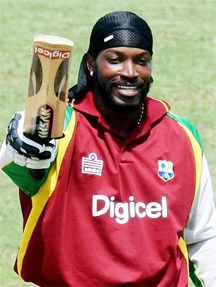By Retired Judge Romain Pitt
Ontario Supreme Court of Justice
Even those who hold power legitimately ought not to exercise such power arbitrarily. Indeed, the history of judicial review is primarily about the struggle of the courts to exercise some control over those invested with authority who would exercise such authority arbitrarily. The concept of “the rule of law” often means no more than “the rule against arbitrariness” in the exercise of power.

Someone ought to ensure that the West Indies Cricket Board gets the foregoing memo. Why? Because it must now be clear to all and sundry that the ongoing Chris Gayle versus the WICB saga will never come to an end until we start dealing with justice and not with power.
Let us take a brief look at the facts of the case which are not in dispute.
Prior to the 2011 World Cup, the West Indies were rated eighth in the world. Early in the series, Dwayne Bravo, the team’s batting all-rounder and emotional leader, was seriously injured with the result that his participation in the tournament ended prematurely. The team performed sufficiently well to reach the quarter-finals before they were finally eliminated.
The teams of India and, in particular, England, which were ranked considerably higher than the West Indies, struggled to eke out a victory over the regional team. Reasonable observers felt that, in both contests, the West Indies’ defeats came more as a consequence of some kind of emotional letdown than as a reflection of inferior ability; in addition, some felt, reasonably, that the presence of Captain Darren Sammy on the team was at times at the expense of Kemar Roach, Andre Russell or Ravi Rampaul, all of whom were likely to contribute more to the team than the captain.
One of the memorable events of the series, in retrospect, was the captain’s praising of Gayle before a game for having not only played with an injury but also for attempting to inspire the less experienced players.
But scarcely had the bails been removed after the team’s final game than the coach made a public announcement that the senior players, that is to say, Shivnarine Chanderpaul, Ramnaresh Sarwan and Gayle who, along with Fidel Edwards and Jerome Taylor, had kept West Indies cricket respectable for years, were primarily responsible for the team’s poor performance. He was not sure, he declared, that he wanted those players to continue to be part of the team going forward unless…
Gayle was not selected for the Pakistan and Indian visits that came shortly thereafter; Chanderpaul was excluded from the One-day team and neither Chanderpaul nor Sarwan played in all the Test matches. All three players had serious conflicts with management thereafter.
Sir Hilary Beckles, a powerful director of the WICB, made some outrageously insensitive remarks about Gayle on the occasion of, of all events, “The Frank Worrell Memorial Lecture.” The WICB took the position that Sir Hilary had spoken in his personal capacity and not in the capacity of a WICB director so that, even if some kind of sanction were called for, the Board had no locus standi.
Gayle, audibly upset and angry, gave a media interview in which he severely criticized the Board, its CEO and coach. Contrary to the WICB and media reports, he did not disparage the captain.
Accepting, for the purpose of this argument, that Gayle’s comments were extremely harsh in that they portrayed the CEO and coach as men of questionable characters, can the Board reasonably exclude Gayle, in the absence of some sort of disciplinary hearing provided for in the WICB’s constitution and bye-laws, from participation in West Indies cricket in perpetuity unless and until he apologizes to the Board and to the coach?
In the past, the question has largely been couched in terms of whether Gayle should or should not apologize. However, perhaps the proper question is not at all whether he should or should not apologise but what should happen in the event that he sticks to his guns and refuses to apologise until the clarification for which he has asked is forthcoming from the Board. And the clear follow-up question is the really crucial one: Does the Board under the circumstances have the right to exclude him from West Indies cricket until he apologizes?
It is my view that they do not have any such authority. The truth or falsehood of Gayle’s allegations, their appropriateness and the appropriate penalty all constitute matter for independent determination. But it would be expecting too much to have the WICB decision makers concede this, given that the majority of them are authoritarian personalities who need to keep their egos under control and appreciate that there are real limits to their power.
Reprinted from The Trinidad and Tobago Review
